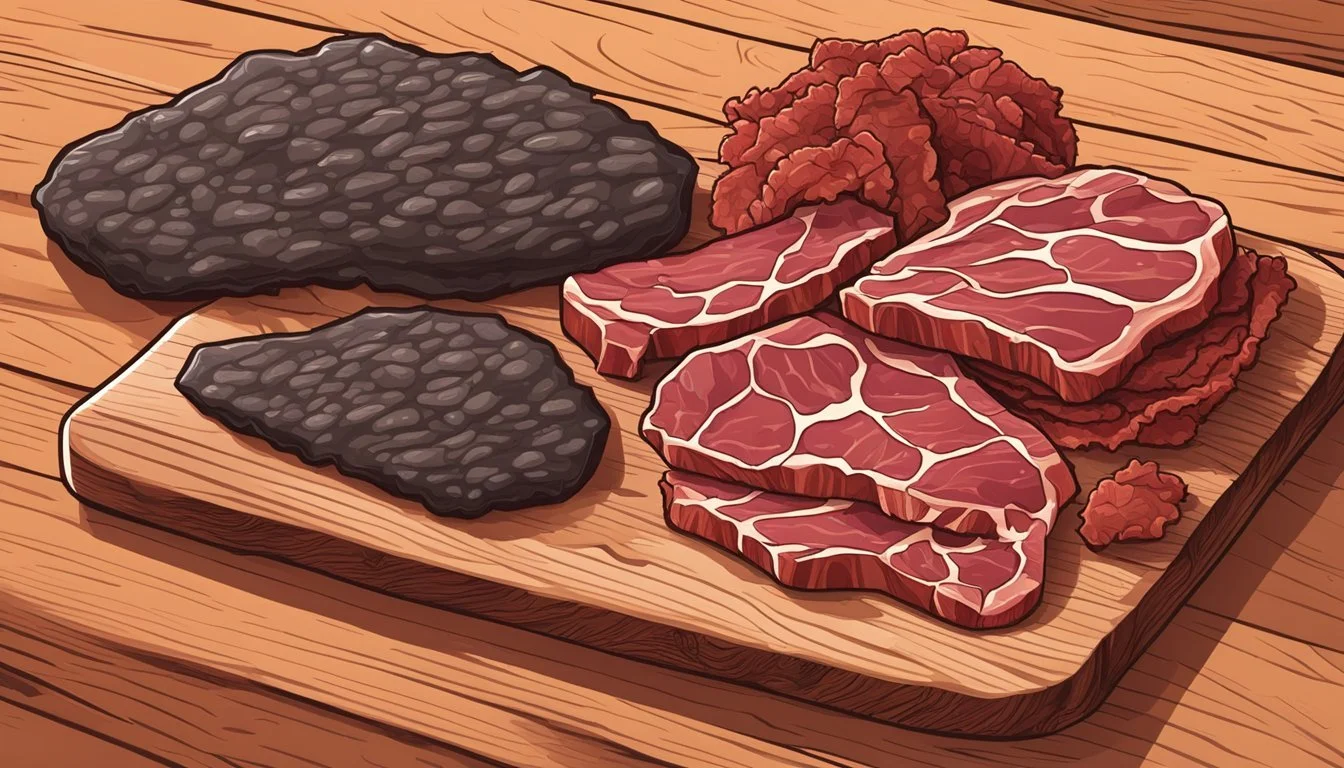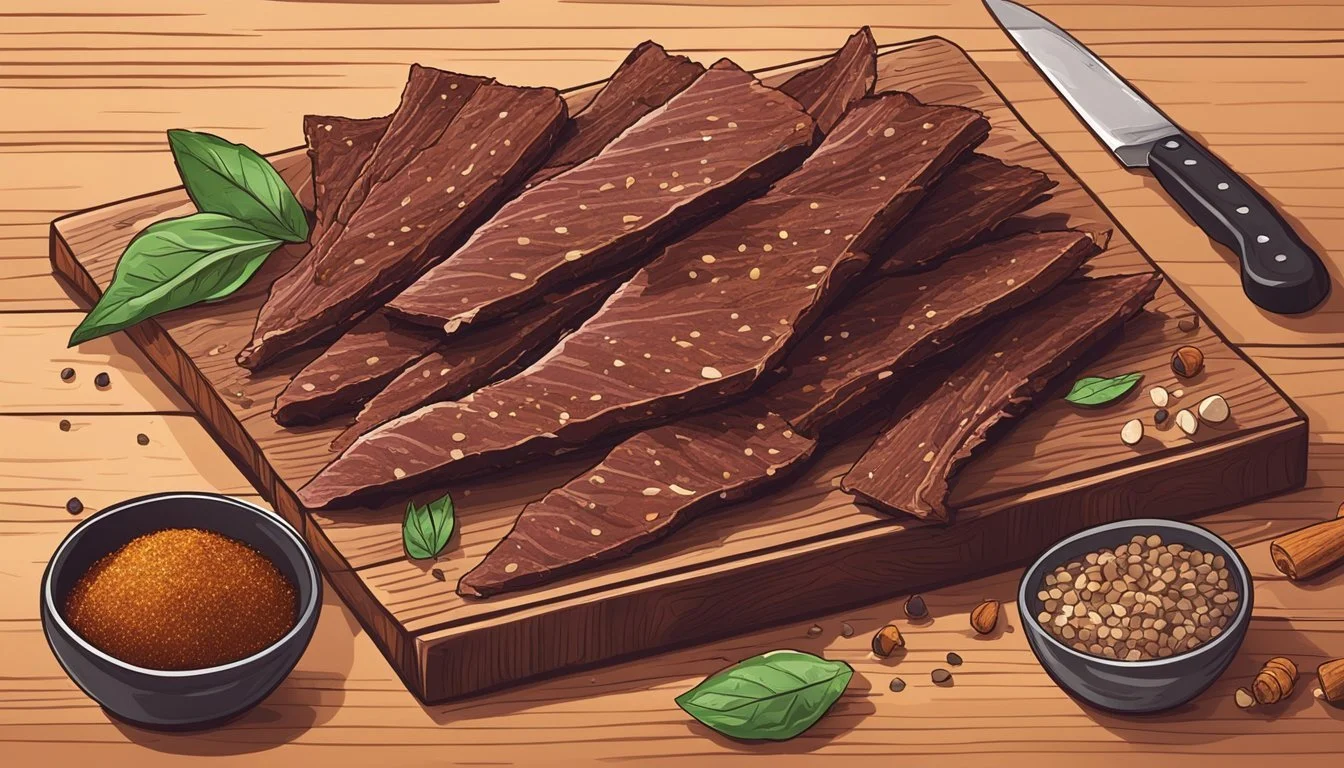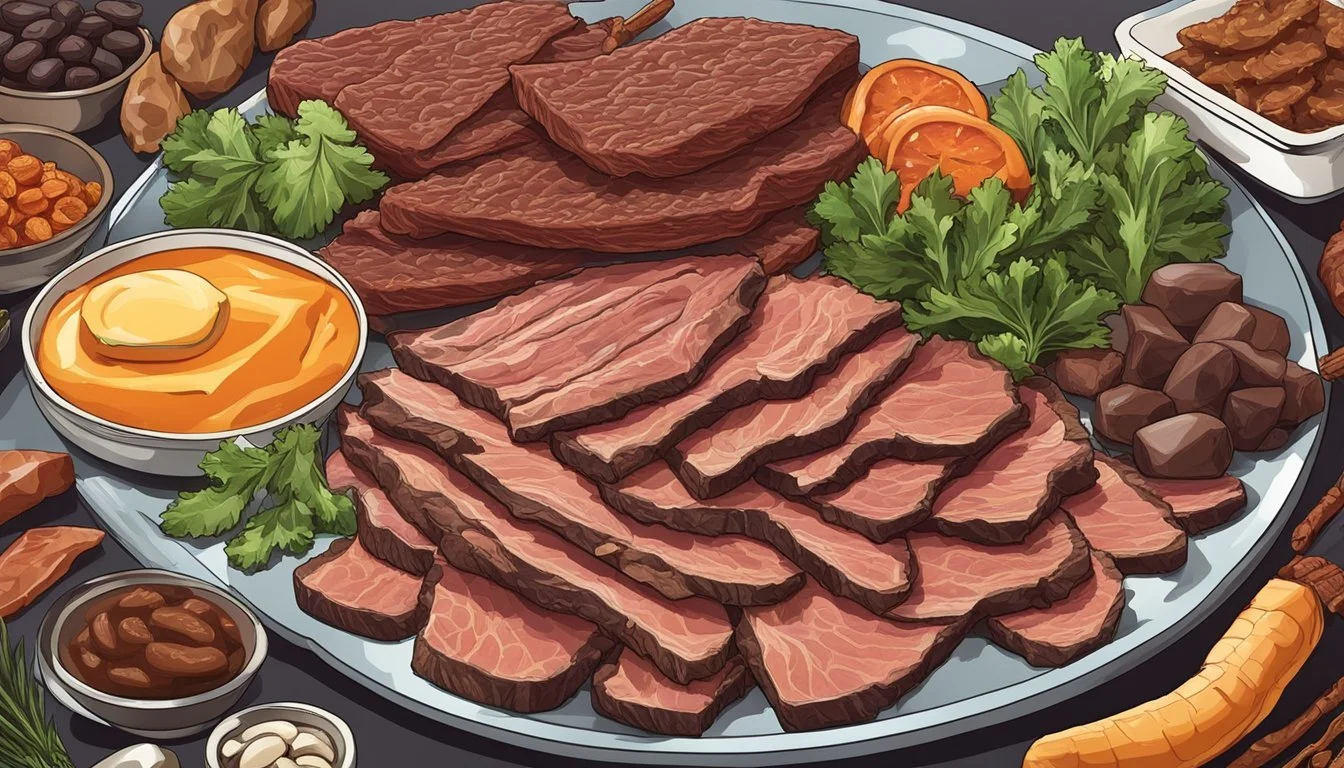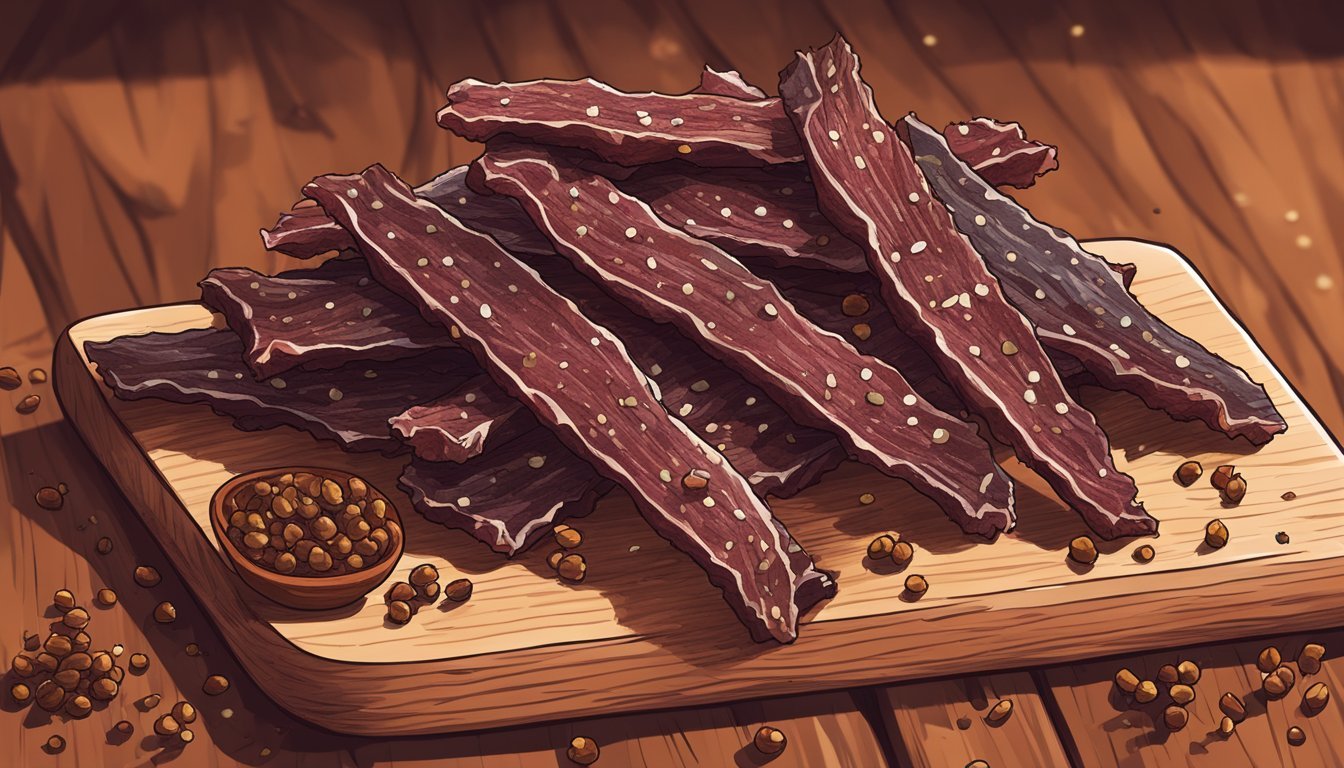Can You Eat Beef Jerky on Carnivore Diet
Guidelines and Considerations
The carnivore diet is a dietary regimen that consists entirely of animal products excluding all plant-based foods. This restrictive diet is focused on the consumption of meat, fish, eggs, and certain dairy products. As individuals seek convenient and portable food options while adhering to this strict dietary pattern, beef jerky often comes up as a potential snack option.
Beef jerky is generally made from lean cuts of beef that are seasoned and dehydrated. For those on a carnivore diet, beef jerky can be appropriate as it is primarily a meat product with a high protein content. However, to align with the carnivore diet's principles, the jerky selected must be free of sugar and non-meat additives. It is essential to choose varieties of beef jerky that do not contain any ingredients that fall outside the diet's guidelines.
As a snack, beef jerky offers convenience for people following the carnivore diet, especially when on the go or in need of a quick protein source. Although the diet's emphasis is on fresh and unprocessed meats, beef jerky can fit into this eating pattern if it is free from prohibited ingredients. Those following the diet should carefully check product labels to ensure compliance with the strict dietary restrictions of the carnivore diet.
Understanding the Carnivore Diet
The carnivore diet focuses on consuming exclusively animal products and excludes all plant-based foods, posited as a means to various health benefits and a possible weight-loss strategy.
Fundamentals of Carnivore Diet
The carnivore diet is a restrictive regimen that involves eating only animal products—meat, fish, eggs, and certain dairy products. It eliminates all plant-based foods, hypothesizing that a more ancestral eating pattern leads to better health. Proponents often compare it to a ketogenic diet because of its potential to put the body into a state of ketosis, where fat is burned for energy in the absence of dietary carbohydrates.
Health Benefits and Risks
Some individuals report weight loss and mental clarity on the carnivore diet, attributing these effects to the elimination of sugar and processed carbohydrates. However, health professionals caution that the diet can lead to nutrient deficiencies and raise the risk of other health issues such as increased cholesterol levels and potential risk of heart disease due to the high saturated fat intake. As with any diet, the benefits and risks may vary greatly among individuals.
Comparison With Other Diets
Unlike more balanced approaches, the carnivore diet provides a stark contrast to diets that include a variety of plant-based foods, such as Mediterranean or vegetarian diets. In comparison to other low-carb diets, the carnivore diet is more extreme, potentially leading to a faster transition into ketosis. It’s essential for individuals to consult with healthcare professionals before making such significant changes to their eating patterns, especially when comparing the carnivore diet to less restrictive diets.
Role of Beef Jerky in a Carnivore Diet
Beef jerky can be a practical component of a carnivore diet, providing essential nutrients in a convenient form when selected and prepared appropriately.
Nutritional Profile of Beef Jerky
Beef jerky typically has a high protein content, essential for muscle repair and growth. It is also a source of fat, depending on the cut of the beef used, and contains minimal carbohydrates. Most importantly, one should ensure that the beef jerky contains no added sugars or excessive salt which could detract from its nutritional compatibility with the carnivore diet.
Commercial vs. Homemade Beef Jerky
Commercial beef jerky often includes preservatives and artificial ingredients to enhance flavor and extend shelf life, which are not ideal for a strict carnivore diet. In contrast, homemade beef jerky allows for control over the ingredients, ensuring the exclusion of non-animal products and unnecessary additives.
Selecting the Right Beef Jerky
When opting for beef jerky on a carnivore diet, one should prioritize products made from grass-fed beef, which typically offer a better omega fatty acid profile than grain-fed options. It's important to review the ingredients list carefully to avoid those with added sugars, excess salt, and any artificial ingredients.
Preparing and Consuming Beef Jerky
Beef jerky is a savory treat that can be tailored to fit within the confines of a carnivore diet. Making beef jerky at home allows for control over ingredients, ensuring the exclusion of non-compliant items such as sugars and artificial seasonings. Proper storage is important to maintain its freshness and flavor, and beef jerky offers versatility as a portable and flavorful addition to meals.
Making Beef Jerky at Home
To create a carnivore-friendly beef jerky recipe, one should start with high-quality, grass-fed beef. Using a dehydrator or an oven set to a low temperature can effectively remove moisture while retaining the meat's nutrition and taste. Seasoning should be limited to carnivore diet-approved spices—if any are allowed at all. The following steps outline the process:
Select and thinly slice the beef against the grain for tender jerky.
Optionally season the meat while ensuring that all ingredients comply with the carnivore diet.
Arrange the slices on dehydrator trays or a lined baking sheet, ensuring they do not overlap.
Dehydrate at 225°F (110°C) until the jerky is dry to the touch but still pliable, typically several hours.
I highly recommend purchasing dehydrator and baking sheet online for a convenient shopping experience!
Proper Storage and Preservation
Once beef jerky is prepared, its shelf life can be extended through correct storage methods. An airtight container or vacuum-sealed bag is ideal for preventing spoilage and keeping the jerky dry. It should be stored in a cool, dark place to prevent the fats from going rancid. For long-term storage, the refrigerator or freezer can be used. To maximize preservation:
Store in a cool, dark location.
Use airtight containers or vacuum-sealed bags.
Consider refrigeration for extended shelf life.
If you're looking for an airtight containers, buying it online is your best bet!
Incorporating Beef Jerky into Meals
Beef jerky's portability makes it a practical food choice for individuals on the go. As a flavorful and high-protein snack, it can be enjoyed on its own or used to enhance the taste of other carnivorous dishes such as salads or wrapped around cheese sticks. Here are a few ways beef jerky can be incorporated:
Diced into bite-sized pieces and added to a carnivore diet-friendly omelet or scramble.
Consumed as a standalone snack to satisfy hunger between meals.
Remember, when incorporating beef jerky into meals, one must remain mindful of any additional ingredients to ensure they align with the principles of the carnivore diet.
Macronutrients and Micronutrients
The carnivore diet's emphasis on animal products means it is rich in proteins, fats, and certain micronutrients essential for the body's functions.
Proteins and Amino Acids
Beef jerky is an excellent source of protein, providing all the essential amino acids the body requires for repair and growth. Amino acids are the building blocks of proteins, crucial for muscle development and various metabolic processes. Beef jerky generally offers around 9 to 15 grams of protein per ounce, which contributes significantly towards meeting an individual's daily protein needs.
Fats and Healthy Fats
While beef jerky is made from lean cuts and therefore has a reduced fat content, it still contains some fat, including healthy fats. These fats are necessary for nutrient absorption and energy. Beef jerky typically provides a balance of saturated and monounsaturated fats. It's important to consider the fat quality of the beef jerky consumed, with grass-fed beef offering higher levels of omega-3 fatty acids.
Vitamins and Minerals
Beef jerky can be a good source of various vitamins and minerals. It is especially rich in Vitamin B12, which is necessary for blood formation and brain function. Other B vitamins often found in beef jerky include niacin, riboflavin, and thiamine, which play a role in energy metabolism. Minerals such as phosphorus, crucial for healthy bones and teeth, and iron, essential for blood cell production, are present in beef jerky. However, due to the preservation process, beef jerky can have a high sodium content, which should be monitored within the context of overall dietary intake.
Aligning Beef Jerky Consumption with Carnivore Diet Goals
Beef jerky can serve as a beneficial food choice within the framework of a carnivore diet, particularly when it aligns with the diet's focus on high-protein intake for weight management, muscle health, energy levels, and mental clarity.
Weight Management and Muscle Mass
Beef jerky is an excellent source of high-quality protein, which is essential for both weight loss and muscle mass maintenance or growth. The protein in beef jerky aids in muscle repair and recovery, making it a suitable snack for those looking to support their lean body composition goals within a carnivore diet.
High protein content: supports satiety, reducing the likelihood of overeating
Muscle repair: vital for recovery post-exercise
Energy and Mental Clarity
Consumers of beef jerky may find it beneficial for sustaining energy and enhancing mental clarity, two aims of the carnivore diet. Its low carbohydrate content prevents energy fluctuations often associated with high-carb diets, while the amino acids in protein support neurotransmitter functions, potentially improving mental focus and clarity.
Stable energy levels: due to low carb content
Support for cognitive functions: amino acids from beef jerky promote neurotransmitter health
Maintaining a Balanced Diet Within Carnivore Diet
A balanced carnivore diet includes various types of animal products to provide all the necessary nutrients. Beef jerky, being minimally processed and carbohydrate-free, fits well into this pattern, provided it's made without additives that are not permitted on the diet.
Varied animal products: ensures a range of nutrients
Minimal processing: aligns with the carnivore diet's emphasis on natural foods
Potential Dietary Restrictions and Considerations
When adopting a carnivore diet, individuals must consider potential dietary restrictions and how to adapt the diet to meet specific needs, such as allergies or intolerances.
Modifications for Allergies and Intolerances
Allergies: Individuals with allergies to certain animal-based foods, like eggs or dairy, may still follow a carnivore diet by excluding these items. Beef jerky, a staple snack for many on this diet, typically does not contain dairy or eggs, making it suitable for those with such allergies.
Eggs: Omit from diet if allergic.
Dairy: Choose beef jerky without dairy-based ingredients.
Intolerances: Those with sensitivities to specific elements, like lactose or histamines, found in certain meat products need to be vigilant.
Lactose Intolerance: Can consume lactose-free animal products.
Histamine Intolerance: May need to avoid aged meats, opting for fresh beef jerky instead.
Navigating Dietary Restrictions
The carnivore diet eliminates several food groups, requiring attention to particular nutritional needs.
Grains
Fruits
Vegetables
Nuts
Seeds
Legumes
Each of these categories is excluded from the diet, leading to an emphasis on animal products for all nutritional needs. Beef jerky, if chosen carefully, can be included but should be free of prohibited items.
Grains, Fruits, Vegetables, Nuts, Seeds, Legumes: Not consumed on the carnivore diet; beef jerky must not contain these as ingredients.
Added Sugars: Often found in commercial beef jerky, it should be avoided to adhere strictly to the diet's guidelines.
When selecting beef jerky, one must ensure it has no:
Added Sugars: Select brands with zero added sugars.
Artificial Ingredients: Look for labels that list natural, minimal ingredients.
By carefully choosing beef jerky that complies with the restrictive nature of the carnivore diet, individuals can enjoy this snack while adhering to the diet's strict framework.
FAQs on Consuming Beef Jerky in a Carnivore Diet
Is beef jerky allowed on the carnivore diet?
Yes, beef jerky is permissible on the carnivore diet so long as it is free from non-animal additives such as sugars or artificial preservatives.
What should individuals look for when selecting beef jerky for this diet?
They should opt for beef jerky that is:
Made from high-quality, grass-fed beef
Free from added sugars and sweeteners
Lacking preservatives and artificial ingredients
Low in carbs to maintain the zero-carb principle of the carnivore diet
Why is beef jerky considered a good option for the carnivore diet?
It’s rich in protein and essential nutrients
Offers benefits for weight maintenance due to its satiating effect
Nutrient Relevance to Carnivore Diet
Protein
Relevance: Essential for muscle maintenance and repair
Iron and B Vitamins
Relevance: Important for energy levels and overall health
Does beef jerky align with the principle of zero-carb diets like the carnivore diet?
While beef jerky is inherently low in carbohydrates, it's crucial to ensure no extra carbs are introduced through flavorings or additives. It is in alignment so long as the product is pure meat with no additional carbohydrate sources.
Remember, those on a carnivore diet should always check product labels to ensure compatibility with dietary restrictions.








